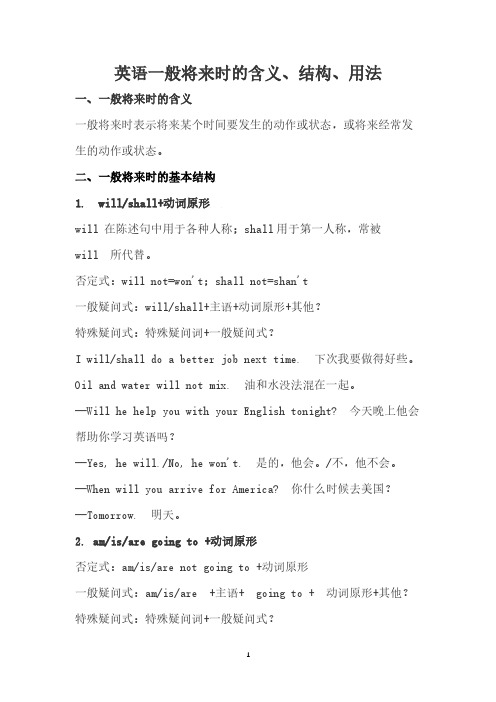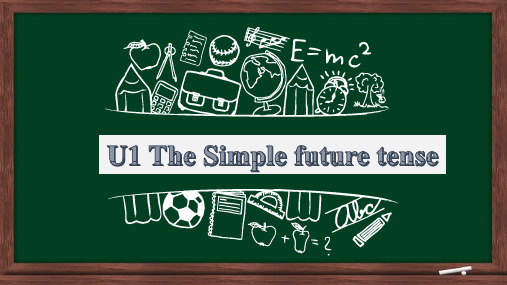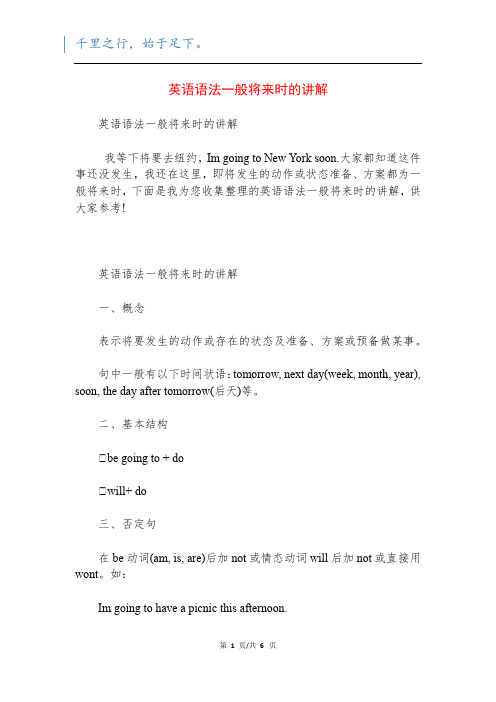高中英语语法之一般将来时
英语语法一般将来时的含义、结构、用法

英语一般将来时的含义、结构、用法一、一般将来时的含义一般将来时表示将来某个时间要发生的动作或状态,或将来经常发生的动作或状态。
二、一般将来时的基本结构1. will/shall+动词原形will 在陈述句中用于各种人称;shall用于第一人称,常被will 所代替。
否定式:will not=won't;shall not=shan't一般疑问式:will/shall+主语+动词原形+其他?特殊疑问式:特殊疑问词+一般疑问式?I will/shall do a better job next time. 下次我要做得好些。
Oil and water will not mix. 油和水没法混在一起。
—Will he help you with your English tonight? 今天晚上他会帮助你学习英语吗?—Yes, he will./No, he won't. 是的,他会。
/不,他不会。
—When will you arrive for America? 你什么时候去美国?—Tomorrow. 明天。
2. am/is/are going to +动词原形否定式:am/is/are not going to +动词原形一般疑问式:am/is/are +主语+ going to + 动词原形+其他?特殊疑问式:特殊疑问词+一般疑问式?He is going to spend his holidays in London. 他打算在伦敦度假。
Look at the dark clouds. There is going to be a storm. 看那乌云,快要下雨了。
Is he going to collect any data for us? 他会帮我们收集数据吗?What are you going to do tomorrow? 明天你打算作什么?三、一般将来时的用法will+动词原形与am/is/are going to +动词原形的用法虽然都表示将来发生动作或情况,一般情况下能互换。
高考英语语法一般将来时归纳总结

高考英语语法一般将来时归纳总结一、单项选择一般将来时1.The class teacher was anxious to hear one of his top students _____ because of family move.A.will leave B.is leavingC.was leaving D.has left【答案】C【解析】be doing可以用来表示将来,指按照时间安排表即将发生的事情,是有计划安排的;will do 强调的是主观性,不表达按时间安排表即将发生的事情。
句意:得知班里一个尖子生因为家庭原因要离开学校,班主任很焦虑。
2.A good film producer must make sure that his films ____ fit into the needs of the changing market.A.are to B.will C.are going to D.are about to【答案】A【解析】试题分析:考查将来时的表达法。
Be to do sth表示计划的事情;表示注定要做某事;也可以表示命令做某事,相当于have to, must,should; will表示一般的将来,或者临时决定做某事;be going to do sth表示按照计划安排要做某事;或者根据某种迹象要做某事;be about to do sth即将做某事,不与表示将来时的时间状语连用。
句意:好的电影出品人要确保他的电影应该满足不断变化的市场的需要。
该句中的be to =should.故A正确。
考点:考查将来时的表达法点评:Be to do sth表示计划的事情;表示注定要做某事;也可以表示命令做某事,相当于have to, must,should; will表示一般的将来,或者临时决定做某事;be going to do sth表示按照计划安排要做某事;或者根据某种迹象要做某事;be about to do sth即将做某事,不与表示将来时的时间状语连用。
英语语法—一般将来时态

eg. My uncle is coming to see me tomorrow.
五、一般将来时特殊句式
1. There be 句式的一般将来时
Eg. There will be +其他 There is going to be+其他
2. 客观事实用一般现在
情态动词 (1)can/could:能够 could逾期 更委婉 (2)May/might 许可,准许 (3)Should 应该 主观义务
Have to 必须、不得不 (4)Must 主观必须,Must...?Yes,you must/no,you needn’t
Mustn’t 禁止 (5)Need 需要 Need...?Yes,you must/no,you needn’t
三、一般将来时 时间状语
Tomorrow、 Next week/month/year、 in+时间段、 this evening、 in the near future
四、一般将来时例句
1. 表示将来某个时间要发生的事 情或存在的状态。
eg.We will clean the room next week.
一、一般将来时用法(4)
1. 表示将来某个时间要发生的事 情或存在的状态。
3.条件、时间状语从句中,用一般 现在时表将来。
2. be going to 表示将要发生 或者打算、计划要做的事情,或者 可能发生的事情
4.go、come、leave、start等进行 时态表将来。
二、一般将来时结构 1. will / shall + 动词原形
Will / Shall +主语 + 动原 ?
英语语法 什么是一般将来时

英语语法什么是一般将来时一般将来时(Simple Future Tense)是英语语法中用来表示将来发生的动作、事件或状态的一种时态。
它在句子中起着重要的作用,可以帮助我们准确描述未来的计划、意图或预测。
在这篇文章中,我将详细探讨一般将来时的用法和构造,以及一些常见的例子。
请注意,这是一个详细的讨论,所以文章会比较长。
让我们开始吧!一、一般将来时的构造一般将来时的构造非常简单,主要由助动词"will"或"shall"加上动词的原形构成。
下面是一些例子:1. I will go to the party tomorrow.我明天会去参加派对。
2. She will study abroad next year.她明年会出国留学。
3. They will visit their grandparents this weekend.他们这个周末会去看望他们的祖父母。
4. We shall meet at the park.我们将在公园见面。
5. He will not come to the meeting.他不会来参加会议。
6. Will you help me with my homework?你会帮我做作业吗?二、表示计划和意图一般将来时常常用来表示将来的计划、意图或打算。
下面是一些例子:1. We will have a meeting tomorrow.我们明天会开会。
2. She will start a new job next month.她下个月会开始一份新工作。
3. They will travel to Europe next summer.他们明年夏天会去欧洲旅行。
4. I will buy a new car next year.我明年会买辆新车。
5. He will learn to play the piano.他会学弹钢琴。
6. We shall visit our friends in the evening.我们晚上会去拜访我们的朋友。
英语语法:一般将来时解释集

英语语法:一般将来时解释大全一、基本定义一般将来时是英语时态的一种,表示将来的动作或状态。
它主要用于描述未来的计划、预测或期望发生的事情。
二、形式构成一般将来时的构成主要有以下几种形式:1. 基本结构:主语+ will /shall + 动词原形+ 其他成分。
这是最基本的一般将来时形式,表示将来的动作或状态。
2. be going to 结构:主语+ be(am, is, are)going to + 动词原形+ 其他成分。
这种结构表示计划或安排将要发生的事情,也可以表示根据目前的迹象或情况预测将会发生的事情。
3. be+动词不定式:主语+ be(am, is, are)to + 动词原形+ 其他成分。
这种结构表示计划或安排将来要做的事情。
4. be+动词ing:主语+ be(am, is, are)+ 动词ing形式+ 其他成分。
这种结构表示即将发生的动作,通常与“when”连用。
5. be+表示时间的介词短语:主语+ be(am, is, are)+ 表示时间的介词短语。
这种结构用于表示将来某个时间点的情况。
6. 将来时间状语:tomorrow, next week, in the future等以上就是一般将来时的主要构成形式。
需要注意的是,在具体使用时,应根据语境和上下文选择合适的构成方式。
三、用法场景1. 表达未来的计划或意图,例如:I will go to the beach next summer.2. 描述未来的预测或期望,例如:It will rain this afternoon.3. 在条件句中表示将来的结果,例如:If you study hard, you will pass the exam.四、与其他时态的区别1. 与现在进行时态的区别:现在进行时态强调正在进行的动作,而一般将来时态强调将来的动作或状态。
2. 与过去时态的区别:过去时态表示过去的动作或状态,与将来时间无关。
(完整版)高中一般将来时讲解

(完整版)高中一般将来时讲解高中一般将来时讲解(完整版)一般将来时是英语语法中的一个重要时态,用来表示将来发生的动作或状态。
在高中阶段,学生需要掌握和运用一般将来时来描述将来的计划、意图、预测等。
下面我们将详细介绍高中一般将来时的使用和构成。
使用一般将来时可以用于以下几种情况:1. 表示将来的计划或安排。
例如:I will go to the beach this weekend.(我将在这个周末去海滩。
)2. 表示将来的意图。
例如:She will study medicine in college.(她打算在大学研究医学。
)3. 表示将来的预测或推测。
例如:It will rain tomorrow.(明天会下雨。
)构成一般将来时的构成非常简单,只需将"will"(shall)加在动词的原形前即可。
例如:I will study.(我将要研究。
)He will go.(他将要去。
)注意事项在使用一般将来时时,还需要注意以下几点:2. 疑问句的构成是将"will"(shall)置于句首。
例如:Will you attend the meeting?(你会参加会议吗?)3. 一般将来时通常不能用于表示固定的时间表或时间表安排,此时应使用其他时态。
例如:The train leaves at 9 a.m.(火车在上午9点离开。
)希望以上内容能够帮助你更好地理解和运用高中一般将来时。
如果还有任何问题,请随时向我提问。
英语语法一般将来时的讲解

英语语法一般将来时的讲解英语语法一般将来时的讲解我等下将要去纽约,Im going to New York soon.大家都知道这件事还没发生,我还在这里,即将发生的动作或状态准备、方案都为一般将来时,下面是我为您收集整理的英语语法一般将来时的讲解,供大家参考!英语语法一般将来时的讲解一、概念表示将要发生的动作或存在的状态及准备、方案或预备做某事。
句中一般有以下时间状语:tomorrow, next day(week, month, year), soon, the day after tomorrow(后天)等。
二、基本结构①be going to + do①will+ do三、否定句在be动词(am, is, are)后加not或情态动词will后加not或直接用wont。
如:Im going to have a picnic this afternoon.Im not going to have a picnic this afternoon.I will go to have a picnic tomorrow.I will not/wont go to have a picnic tomorrow.四、一般疑问句be或will提到句首,some改为any, and改为or,第一二人称互换。
如:We are going to go on an outing this weekend.Are you going to go on an outing this weekend?五、对划线部分提问。
一般状况下,一般将来时的对划线部分有三种状况。
1. 问人。
Who 如:Im going to New York soon.Whos going to New York soon?2. 问干什么。
What 如:My father is going to watch a race with me this afternoon.What is your father going to do with you this afternoon?3. 问什么时候。
语法讲解一般将来时

be doing结构表示将来时间
表示按计划安排即将发生的动作
The train is leaving at 5 o'clock.
表示根据时间表或日程安排即将发生的动作
The plane is taking off in 10 minutes.
表示按计划或约定即将发生的动作
We are meeting at the restaurant at 7 tonight.
go D. will, do, go
选择题练习
答案:D
解析:根据时间状语this weekend,第一空应使用将来时态;第二空是be doing表 示将来;第三空表示个人意愿,应使用一般现在时态。
翻译练习
我将在下个月去旅行。 答案:will go
I _____ _____ on a trip next month.
1 2
表示意愿或承诺做某事
I will help you with your project if you need me.
表示临时决定做某事
I will go to the store later, I don't have any milk left.
3
表示假设条件下的将来行动
If you don't mind, I will stay for dinner.
语法讲解一般将来时
目录
• 引言 • 一般将来时的定义和构成 • 一般将来时的基本用法 • 一般将来时的特殊用法 • 一般将来时的否定句和疑问句形式 • 练习和巩固
01
引言
主题简介
一般将来时是英语语法中的一种时态,用于描述将来发 生的事件或动作。
它通常由助动词will或shall后接动词原形构成,表示未 来的行为或状态。
- 1、下载文档前请自行甄别文档内容的完整性,平台不提供额外的编辑、内容补充、找答案等附加服务。
- 2、"仅部分预览"的文档,不可在线预览部分如存在完整性等问题,可反馈申请退款(可完整预览的文档不适用该条件!)。
- 3、如文档侵犯您的权益,请联系客服反馈,我们会尽快为您处理(人工客服工作时间:9:00-18:30)。
1、表示将来某一时刻即将发生的动作或状态 2、表示将来经常发生的动作 3、表示将来的必然趋势或某事物所具有的固有特性
用法
与表示将来的时间状语连用,如:
tomorrow (明天)
before long (不久)
the day after tomorrow (后天)
next week (下周)
be to do
①表按计划或安排即将发生的动作 ②表示约定,责任,命令,或注定要发生的动作。 ③官方计划或决定(常见于报纸或广播) e.g. He and I are to meet at the railway station tomorrow. You are not to be back late. If not watered, the plants are to die. The president is to speak on TV tonight.
There will be only one country. 否定句:在will后面加not.
There won’t be only one country. 一般疑问句:把will提到there之前。
Will there be only one country? Yes, there will. / No, there won’t.
soon (很快)
in the future (将来) in three days (三天后)
some day (将来的某一天)
结构
1.will+动词原形 (I /we shall) 2.be going to + 动词原形 3.be+to do 表示计划,责任,约定或命令 4. be about to do sth. 表示正要做…,马上要做…
will
will常用于第二、三人称,但在口语中各种人 称都可以用will.
否定式:will not = won’t
பைடு நூலகம்
will与shall+v.
• 祈使句+ and/or+将来时(will)
Work hard or you will fail. 努力工作否则你就会失败。 Work hard and you will succeed. 努力工作你就会成功。
Exercises
1. — What would you do if it _____ tomorrow ?
— We have to carry it on, since we’ve got everything
ready.
A. rain C. will rain
√B. rains D. is raining
be doing
go, come, leave, start, arrive, stay, fly, land, take off 等动词可用现在进行时表示安排和划或即将发生的 动作。
We’re leaving for Qingdao. 我们明天动身去青岛.
特殊用法
表示 与生日,日历,课时安排或交通时刻表有关的动作 (一种规律) ,用一般现在时表示将来时态。 常用于转移动词如:begin, come , leave, go, arrive, start, stop, return, open, close…
2. — What are you going to do this afternoon?
— I am going to the cinema with some friends. The
film _____quite early, so we ____ to the bookstore
after that.
• If you come this morning, we will have a meeting. When I graduate, I will go to the countryside
“There be”句型的一般将来时 肯定句: There will be +名词+其他成份 [注意]:无论后面加单数名词或复数形式,be都必须用原形。
√C. I’ll
B. I prefer to D. I’d rather
5. —Write to me when you get home. — ____________. A. I must B. I should
√C. I will D. I can
6. Let’s keep to the point or we _____ my decisions.
be going to与will的区别
will
未经事先考虑的意图,临时决定的。
be going to 事先考虑好的意图,或做好安排.
If you want to go, I’ll meet you at 5 o’clock. (临时的决定)
I feel terrible, I think I’m going to be sick. I’m going to be 16 years old next year. Look at the clouds! It’s going to rain! (表示有迹象要发生某一动作时,要用be going to)
A. finished; are going
B. finished; go
√C. finishes; are going
D. finishes; go
3. My younger brother ____be 15 years old next year.
A. is going to C. is to
√A. will never reach B. have never reached C. never reach D. never reached
7. If he _____ to college, he _____ a lot more. A. will go; will learn B. will go; is going to learn
be going to
①表示计划,安排要做的事 --- What _a_r_e__y_o_u_g_o_i_n_g__to__do this evening? --- I am going to do my lessons.
②表示现在的迹象推断未来可能发生某事。
看那些乌云要下雨了. Loot at the dark clouds. It _i_s_g_o_i_n_g_t_o_rain.
√C. goes; will learn D. goes; is going to learn
• 3. will+v.有时表示说话时的临时决定或打算。 --- My car won’t start. --- Don’t worry, I will come and give it a push.
will 和 shall 的缩写形式都是’ll
注意:shall与will的区别:
shall
shall常用于第一人称. 否定式:shall not = shan’t
The evening class begins at 19:00. 晚课7点开始。 The train starts at two. 火车两点出发.
主将从现
• 在时间或条件状语从句中,主句用将来时,从句用 一般现在时表示将来时,标志:when, as soon as, before, once, if , unless, even if, in case等
(不能与表示将来时间的状语连用) 5.be+doing sth. 6.一般现在时表将来
will与shall+v.
• 1. 表示一个将来的动作或状态,“要…,会…” She will go to the park tomorrow.
• 2. 表示不以人的意志为转移的自然发展的事。 Tom will be 18 next year. Spring will come again.
be about to do
表示正要做…,马上要做... (不能与表示将来的时间状语连用) 特殊句式:was /were about to do … when…
正要…突然发生…
• 英语晚会即将开始。 • The English Evening Party is about to begin. • 我正要出去,这时下起了雨. • I was about to go out when it began to rain.
√B. will D. should
•表示不以人的意志为转移的自然发展的事用 will
4. — Sorry, I forgot to post the letter for you.
— Never mind, _____ post it myself tonight.
A. I’m going to
